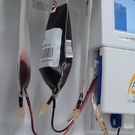
The results of a small Phase 2 study indicate that sequential maintenance therapy involving six months of Velcade followed by six months of thalidomide is both effective and tolerable in multiple myeloma patients who have received a stem cell transplant.
The Phase 2 trial was carried out recently at the City of Hope National Medical Center in Duarte, California.
Many patients in the trial experienced peripheral neuropathy (nerve damage that causes pain and tingling in the extremities).
However, the City …
Read the full story »

Results from a recent German analysis suggest that Velcade-based treatment both before and after stem cell transplantation leads to better survival outcomes than treatment without Velcade in multiple myeloma patients with a deletion in chromosome 17.
The German analysis used data from a Phase 3 clinical trial in which some patients with chromosomal abnormalities were treated with Velcade (bortezomib)-based therapy, while others were not.
For all types of chromosomal abnormalities, survival was similar or better for patients in the …
Read the full story »
OncoPep and Dana-Farber Sign License Agreement For Myeloma Vaccine Technology – The biotechnology company OncoPep has signed a license agreement with the Dana-Farber Cancer Institute in Boston to further develop and commercialize PVX-410, a potential vaccine-based treatment for multiple myeloma. PVX-410 has been shown to stimulate an immune response against myeloma cell lines. Researchers plan to conduct a Phase 1/2a study this year of PVX-410 in patients with smoldering multiple myeloma. OncoPep also hopes to use the PVX-410 technology to …
Read the full story »

Results of a recent retrospective analysis suggest that donor lymphocyte infusions appear to work better when they are used in patients who have residual multiple myeloma than in those who have relapsed after a donor stem cell transplant.
Donor lymphocyte infusions are considered a preemptive treatment when used in transplant patients with residual disease, and a salvage treatment when used in transplant patients who have relapsed.
“The relapse rate is high with allogeneic (donor) stem cell transplants. Donor lymphocyte infusions …
Read the full story »

The results of a recent retrospective analysis show that the sequence of treatment with Velcade and Revlimid may not have a significant effect on outcomes in multiple myeloma patients.
Only patients with kidney disease had significantly longer survival times if they received Velcade first.
The researchers from the Moffitt Cancer Center in Tampa, Florida, who conducted the analysis pointed out that further prospective trials are needed to confirm their findings.
The results were presented during a poster session at the …
Read the full story »

The final results of a Phase 1/2 clinical trial indicate that perifosine in combination with Velcade and dexamethasone may be effective in multiple myeloma patients who previously relapsed from or were treatment-resistant to Velcade.
The trial results made a favorable impression on Dr. Philip McCarthy of the Roswell Park Cancer Institute in Buffalo, New York, who was not involved in the study.
“This combination had activity with an overall response rate (complete response, near complete response, partial response, and minor …
Read the full story »
Viracept Demonstrates Anti-Myeloma Activity – Results of a recent preclinical trial show that Viracept (nelfinavir), alone or in combination with other common myeloma drugs, prevents myeloma cell growth and causes cell death. Viracept is a protease inhibitor and is approved in the United States and Canada for the treatment of HIV. Studies have suggested that protease inhibitors such as Viracept may be effective against cancer. It is thought that they may work similarly to proteasome inhibitors like
Read the full story »

